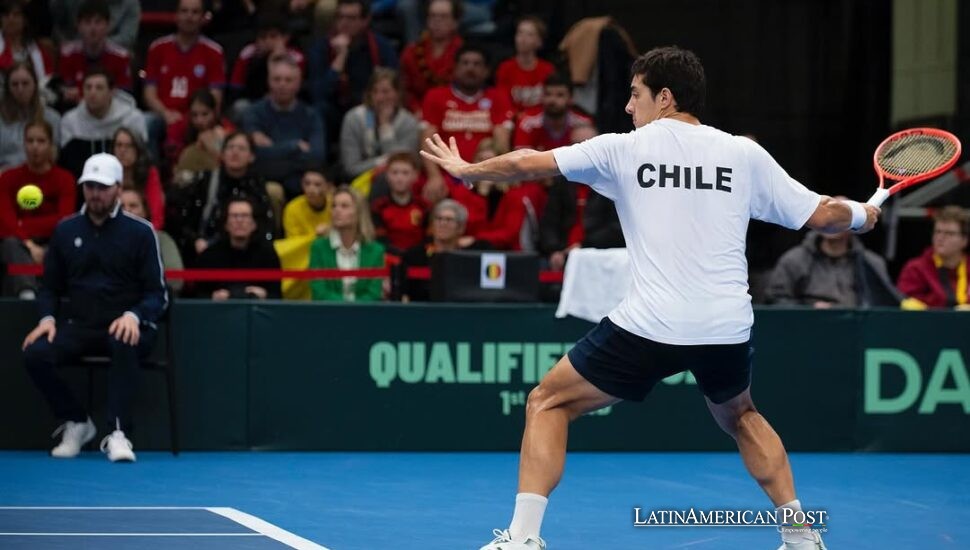Chilean Tennis Federation Fury Over Cristian Garin Davis Cup Chaos

Allegations of biased officiating, a disputed injury incident, and calls for disqualification have ignited a Davis Cup storm. The Chilean Tennis Federation is taking action, denouncing the International Tennis Federation’s handling of an on-court collision that marred Chile’s hopes.
A “Scandalous” Turn of Events
Last Sunday night, few would have anticipated that a high-stakes Davis Cup tie between Chile and Belgium would end in accusations of inadequate officiating, calls for default, and an international imbroglio. Yet that is precisely what occurred in Hasselt, Belgium, when Zizou Bergs struck Chile’s Cristian Garín in the face with his shoulder during a celebratory sprint toward his bench. The Chilean Tennis Federation (Fetech), outraged by the outcome, has labeled the International Tennis Federation’s (ITF) handling of the situation as “scandalous.”
Citing an official Fetech press release, local and international outlets reported that Chile had formally requested the match be awarded to Garín and for the decisive rubber in the Davis Cup tie to be replayed. However, the ITF rejected these appeals, affirming that the incident was merely a “collision” and that the neutral referee and doctor had acted appropriately. Furious with this conclusion, Chile’s Federation announced that it would pursue the matter before “competent sports bodies,” including, as they noted, the Chilean Olympic Committee.
The International Tennis Federation’s decision led to Chile’s exit at this point, which now requires the team to compete in Group I this fall to earn a place in next year’s qualifiers. Rather than concede defeat, the Chilean side interprets this outcome through two lenses: a failure in match oversight and proof of flawed regulations. The Federation made its position clear by announcing, “In response to these unacceptable deeds, we state that our group has begun legal proceedings against the sports authorities in charge.”
But Fetech added a note of restraint, stating this message stands as their sole public comment “to respect legal procedures.” Chile’s approach now pivots to ensuring that Cristian Garín’s claims of mismanagement—particularly his assertion that he was in no condition to keep playing—are taken seriously. The question looming over the tennis world is whether the ITF’s refusal to order a default for what many perceived as a reckless, if an unintentional, on-court collision might establish an unsettling precedent going forward.
How a Collision Rocked the Davis Cup
The on-court incident that prompted these accusations occurred with Belgium leading Chile 2-1 in the tie. Bergs, who had just broken Garín’s serve with a brilliant forehand pass to go 6-5 up, sprinted in celebration. At the same time, Garín headed toward his bench, presumably for a changeover routine. To the horror of spectators and commentators, Bergs’ right shoulder crashed into Garín’s face, causing the Chilean to collapse onto the court, clutching his right eye.
Accounts from The Athletic, credited to journalists on-site, indicate that Bergs immediately apologized. Nevertheless, emotions ran high, especially on the Chilean side. The chair umpire, longtime official Carlos Ramos, issued Bergs a code violation for unsportsmanlike conduct. Chile contended that this was far too lenient and demanded a default. Per Davis Cup regulations, any physical abuse of an opponent or official—even if accidental—can result in an immediate disqualification if deemed “flagrant and particularly injurious.”
In a press conference cited by The Athletic, Ramos explained he interpreted the incident as “unfortunate” and accidental, not meriting a default. He said he had consulted the independent tournament doctor, who cleared Garín to continue. By returning a medical all-clear, the doctor effectively left Garín at risk of incurring time violations if he did not resume play within the prescribed interval. But from Garín’s viewpoint, the blow had disoriented him enough to make continuing dangerous, as he felt physically unable to proceed.
Tennis Belgium, the host federation, expressed regret over how the match ended but maintained that Bergs had no malicious intent. As credited by The Athletic, a Tennis Belgium spokesperson said, “It was a moment of carelessness resulting from enthusiasm when Zizou secured a break.” The statement also asked for “calmness and objectivity” one day after the “emotionally charged events.”
Chile, however, saw the matter differently. Garín remained insistent that he was experiencing significant pain and had not “exaggerated,” contrary to suggestions by Bergs. On Instagram, Garín wrote: “I still cannot believe we got disqualified … I have loved this sport for years, and I’ve never thought I would experience something like this … Thanks to the ITF for ZERO WORRY FOR MY HEALTH.” The following morning, he proved his case by showing a photo that captured his swollen, red-tinged eye. According to him, those in charge cared about nothing except finishing up the match.
Fetech’s Complaint and Broader Discontent
While onlookers might wonder if this single collision merits so much controversy, a closer look reveals deeper tensions. In a comprehensive statement circulated by the Chilean Federation of Tennis, Fetech lambasted the ITF’s “lack of analysis” and “little decisiveness,” citing a chain of events they believe was mishandled. They argue the international body’s “passive or dismissive” reaction to the possibility of a more serious sanction demonstrates how certain structural flaws remain within Davis Cup officiating.
According to Fetech, the entire series of punishments was lopsided. They accused Bergs of a “reckless action,” specifically referencing how he not only ran full force through Garín’s path but also allegedly grabbed Garín’s shirt in the process, further destabilizing the Chilean and leading to his fall. Fetech also slammed Bergs’ subsequent statement that Garín was “exaggerating.” They call it “a disrespect” that underscores “the absence of the most basic sporting values.”
In their statement, the Federation criticized the “neutral Belgian doctor” who attended Garín, labeling that professional’s neutrality “questionable” because they have yet to learn the individual’s name. The Chilean Tennis Federation asked the ITF and Davis Cup officials for details about the physician and medical documentation. Yet, those organizations demanded a signed authorization from Garín plus a pledge to treat all records as private. Through their spokesperson, Fetech, the Federation stated that such red tape blocks the open flow of information and raises questions about the fairness of the process.
“The Davis Cup rubber between Zizou Bergs of Belgium and Chile’s Cristian Garín ended with a swollen eye, disqualification pleas, and an international incident,” wrote The Athletic in a separate piece that recapped the match. While the ITF insisted everything from a regulatory perspective was done by the book, the perceived minimal consequence—merely a code violation for Bergs—convinced Chile they had been wronged. Another point of contention is the sequence of time violations that followed for Garín after the medical clearance. Chile affirms that Garín “was not in any condition to continue playing.”
In the eyes of Fetech, the ITF’s refusal to reexamine the case or at least push for an alternative result underscores a double standard. They worry that the rules regarding defaults—like the directive that “unauthorized touching of an opponent” can be grounds for immediate disqualification—were overlooked. Typically, the rules do not consider “intent,” focusing instead on the severity and effect of the contact. “If this isn’t a default case, what is?” asked one disgruntled Chilean official.
Federation: “Protecting Chilean Tennis”
Through official channels, Chilean tennis administrators have pledged to take their case to upper-level sports bodies, such as the International Olympic Committee or the Court of Arbitration for Sport. Their objective centers on two paths: getting clear answers about existing regulations or using Garín’s situation to pinpoint problems in Davis Cup procedures.
Given the official condemnation from Chile’s Olympic Committee—quoted by The Athletic as describing the entire spectacle as a “shameful international incident”—the matter is unlikely to fade quickly. Meanwhile, Cristian Garín, who earned significant ATP success earlier in his career, remains a key figure for Chile in upcoming events. In the short term, however, the immediate repercussion is that Chile must now defend its place in World Group I come September, thereby losing the chance to play a final rubber against Australia for advancement.
Some tennis observers note that the fiasco in Belgium highlights underlying tensions around how to enforce disqualification rules for collisions or inadvertent physical contact. Over the last few years, tennis has witnessed episodes in which players inadvertently strike linespeople or fans with balls but remain unpunished if no serious injury occurs. The Davis Cup rules do not rely on whether harm was intended or if the action was malicious but on whether it “injures” the tie’s integrity or physically endangers an opponent.
Supporting this perspective, longtime tennis official Carlos Ramos—best known for controversies such as the 2018 Serena Williams vs. Naomi Osaka U.S. Open final—defended his choice not to default Bergs. He called the collision an “unfortunate accident.” Yet, in many watchers’ eyes, this result stands out as inconsistent. If a lesser-known official had the same scenario, might they have made a different call? The lack of uniform clarity across tennis events is an ongoing debate among players, fans, and media.
As for the comedic side—some fans have half-jokingly pointed out that sports like soccer see collisions frequently with minimal outcry. Tennis differs from contact sports because it has zero physical interference tolerance, including accidents. “No player ever collides with another – this behavior contradicts tennis principles,” a social media user stated.
The Chilean Federation Fetech’s accusations target alleged “scandalous management” practices opening paths for dispute resolution. The Chilean Tennis Federation objected to ITF’s lack of response to Christian Garín’s report. In addition, the Group pointed out problems with the Davis Cup medical staff’s independence. The staff members did not accept their mistakes during the competition. At the heart of this dispute lies the medical personnel’s conduct, which sparked debate among participants. From their position, the Chilean Tennis Federation stands up for players against rushed scheduling decisions and attempts to minimize these difficulties. According to a spokesperson: “Our organization wants thoroughness in examining what happened, including step-by-step assessments – instead of brushing it off as bad luck.”
Whether or not the ITF relents—or if external bodies put pressure on them—remains uncertain. What is clear is that for many Chilean supporters, the meltdown in Belgium is a bitter example of an unrectified injustice. Meanwhile, Bergs’s defenders maintain that he expressed regret right away and highlight that from the vantage point of the on-court official, the contact appeared unintentional.
At matches played on tennis courts, physical contact between players seldom leads to formal complaints that reach such heights. However, one specific impact changed everything about a Davis Cup outcome. This turn of events brought major consequences: Chile’s path forward ended as Belgium received a spot in the next round. For Cristian Garín—once a top-20 player who had shown a resurgence in form—this might have been a crucial moment in regaining momentum on the global stage. Instead, as he put it, it evolved into “something I never thought I’d experience.”
In the short term, the tennis community will monitor how the Chilean Federation’s promised legal steps proceed. The Federation pledges to stay quiet in public spaces until legal steps finish. Their silence protects formal procedures from corner-cutting tactics. The team sought fair treatment after the Davis Cup incident, yet their goals reached past this case to defend Chilean tennis standards. This position demonstrates their determination: no planned or random incident deserves dismissal when matches face disruption and competitors risk harm.
Also Read: Ozzie Virgil Sr.: Pioneering the Path for Dominican MLB Stars
Looking ahead, whether or not the ITF or higher sports authorities decide to reexamine the matter, the Chile-Belgium Davis Cup clash in 2025 will remain a reference point for controversies involving contact in tennis—one that invites deeper reflection on the rules, officiating standards, and the responsibilities each player, referee, and medical professional must uphold to preserve fairness and player welfare.




